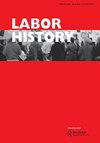逆流。西班牙共产主义中的正统异议(1968-1989)
IF 0.7
4区 管理学
Q1 HISTORY
引用次数: 3
摘要
最近,西班牙共产主义运动的历史研究经历了一个显著的繁荣时期。在西班牙共产党(PCE/ Partido Comunista de España)成立一百周年(1921年)之际,出现了许多作品。除了综合现有知识外,这些作品还探索了西班牙共产主义历史的时刻和方面,直到最近,这些时刻和方面一直处于背景中,被某些时期(如弗朗哥主义)的主要政治焦点所掩盖。正在审查的那本书。(1968 - 1989)(逆流)。来自西班牙北部奥维耶多大学(University of Oviedo)的年轻研究员爱德华多·阿巴德(Eduardo Abad)撰写的《西班牙共产主义中的正统异见》(Orthodox dissent in Spanish communism)一书,在研究主题和方法论方面具有创新性。它所涵盖的时间跨度也有一定的独创性,超越了西班牙向民主过渡的通常限制,延伸到现实社会主义的崩溃(其他最近的作品也开始这样做)。除了少数几篇文章外,最近出版的几本书并没有把重点放在那些由于各种原因试图形成一种政治选择的广泛群体上。我指的是当时新闻界在“亲苏”标签下的各种形式,阿巴德反对这个定义的原因有几个,他在引言中详细阐述了这一点。在分析这些对立团体之前,阿巴德告诉我们,“亲苏”一词“不足以涵盖他们”,因为它低估了他们的异质性,“将他们的身份置于简单陈词滥调的表象之下”(第38页)。阿巴德也不认为区分亲苏分子和“列宁主义者”的标准分类是准确的。阿巴德大胆地打破了对西班牙共产主义“官方”政党的标准关注,这使得这本书成为一部必要的作品,它更好地揭示了西班牙左翼政治文化中更深层次的裂痕。阿巴德更倾向于将这些团体和政党的大杂烩归类为“正统”。在此过程中,阿巴德从政治文化研究中接过接力棒,提出了一个假设,即所有这些团体(诞生于不同的政治局势,对不同的局势作出反应,具有明显不同的武装成分)的实质性、统一因素是对传统共产主义身份的主张。从持不同政见者的角度来看,圣地亚哥·卡里略(1960-1982)独裁领导下的PCE的路线背叛了这一点。正统身份将把政治价值观、组织形式和军事实践结合在一起,并融入以莫斯科为主要极点的国际共产主义运动。然而,这不会是主要因素,也不会在所有情况下都具有相同的重要性,因为一些正统团体也对宗教持批评立场本文章由计算机程序翻译,如有差异,请以英文原文为准。
A contracorriente. Las disidencias ortodoxas en el comunismo español (1968-1989)
Historical studies of the communist movement in Spain have recently experienced a remarkable boom. In the heat of the centenary of the founding (1921) of the Communist Party of Spain (PCE/ Partido Comunista de España), many works have appeared. In addition to synthesizing existing knowledge, these works explore moments and facets of the history of communism in Spain that until recently have been in the background, overshadowed by a largely political focus on certain periods (such as Francoism). The book under review A contracorriente. Las disidencias ortodoxas en el comunismo español (19681989) (Counterflow. Orthodox dissidence in Spanish communism), written by the young researcher Eduardo Abad from northern Spain’s University of Oviedo, is innovative in terms of the subject of study and its methodology. It is also somewhat original in regard to the time period it covers, which goes beyond the usual limit of the Spanish transition to democracy and extends to the collapse of real socialism (something that other recent works have also begun to do). With the exception of a few articles, the most recent books have not focused on the broad constellations of groups which, for various reasons, tried to form a political alternative. I am referring to the various formations that the press of the time grouped together under the label ‘pro-Soviet,’ a definition against which Abad rebels for several reasons that he sets out at length in the introduction. Before analyzing these oppositional groups, Abad informs us that the term pro-Soviet ‘is not adequate to encompass them’ because it undervalues their heterogeneity ‘cornering their identity under the appearance of a simple cliché’ (p. 38). Nor does Abad consider accurate the standard classification that divides pro-Soviets from ‘Leninists’. Abad’s bold break from the standard focus on the ‘official’ party of Spanish communism makes this a necessary work, one better placed to reveal the deeper rifts in Spain’s left political culture. Abad prefers to categorise this conglomerate of groups and parties as ‘orthodox.’ In doing so, Abad takes the baton from studies on political cultures and proposes the hypothesis that the substantial, unifying element of all these groups (born in different political situations, in reaction to different situations and with markedly different militant composition) was the claim to a traditional communist identity. This, from the dissidents’ point of view, was being betrayed by the course of the PCE under the authoritarian leadership of Santiago Carrillo (1960-1982). The orthodox identity would bring together political values, organizational formulations, and militant practices, as well as an insertion into the international communist movement whose main pole was Moscow. However, this would not be the main element, nor would it have the same importance in all cases, since some orthodox groups also took critical positions toward the
求助全文
通过发布文献求助,成功后即可免费获取论文全文。
去求助
来源期刊

Labor History
Multiple-
CiteScore
1.00
自引率
28.60%
发文量
44
期刊介绍:
Labor History is the pre-eminent journal for historical scholarship on labor. It is thoroughly ecumenical in its approach and showcases the work of labor historians, industrial relations scholars, labor economists, political scientists, sociologists, social movement theorists, business scholars and all others who write about labor issues. Labor History is also committed to geographical and chronological breadth. It publishes work on labor in the US and all other areas of the world. It is concerned with questions of labor in every time period, from the eighteenth century to contemporary events. Labor History provides a forum for all labor scholars, thus helping to bind together a large but fragmented area of study. By embracing all disciplines, time frames and locales, Labor History is the flagship journal of the entire field. All research articles published in the journal have undergone rigorous peer review, based on initial editor screening and refereeing by at least two anonymous referees.
 求助内容:
求助内容: 应助结果提醒方式:
应助结果提醒方式:


